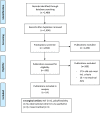Self-management of falls in people with multiple sclerosis: A scoping review
- PMID: 36177511
- PMCID: PMC9772893
- DOI: 10.1177/02692155221128723
Self-management of falls in people with multiple sclerosis: A scoping review
Abstract
Objective: Falls are common in people with multiple sclerosis. There is rising interest in how the multifactorial and chronic nature of fall risk among people with multiple sclerosis can be addressed through self-management. Thus, the aims were to investigate the extent and the scope of publications on self-management of falls in people with multiple sclerosis, and to identify how the concept of self-management was defined and used.
Data sources: A systematic literature search in Medline, Cochrane, Web of Science and PsycInfo was conducted to identify publications until July 2022.
Review methods: Published methodological guidance was followed. Articles targeting: (1) people with multiple sclerosis, (2) falls, and (3) self-management were selected. Of 1656 records, 203 publications were assessed for eligibility, of which 173 did not meet the inclusion criteria, and 16 publications did not contain empirical data. The type of publication, study focus, and study design was extracted. If applicable, key findings, self-management tasks and skills, and the definition of self-management were extracted.
Results: Fourteen original articles met all inclusion criteria. Ten articles represented six different fall prevention interventions. Three publications were randomized controlled trials. Self-management content was variable and not comprehensive in nature. None of the 14 publications included a self-management definition.
Conclusion: The limited number of original articles and the even fewer intervention studies show that the research on self-management of falls in people with multiple sclerosis is in its infancy. To progress in the research area of self-management of falls, a more robust, consensus-based description of self-management frameworks and activities is needed.
Keywords: Behaviour; decision making; education; falls; intervention.
Conflict of interest statement
The authors declared no potential conflicts of interest with respect to the research, authorship, and/or publication of this article.
References
-
- Leray E, Moreau T, Fromont Aet al. et al. Epidemiology of multiple sclerosis. Rev Neurol (Paris) 2016; 172: 3–13. - PubMed
-
- Gunn HJ, Newell P, Haas Bet al. et al. Identification of risk factors for falls in multiple sclerosis: a systematic review and meta-analysis. Phys Ther 2013; 93: 504–513. - PubMed
-
- Giannì C, Prosperini L, Jonsdottir Jet al. et al. A systematic review of factors associated with accidental falls in people with multiple sclerosis: a meta-analytic approach. Clin Rehabil 2014; 28: 704–716. - PubMed
Publication types
MeSH terms
LinkOut - more resources
Full Text Sources
Medical
Miscellaneous


